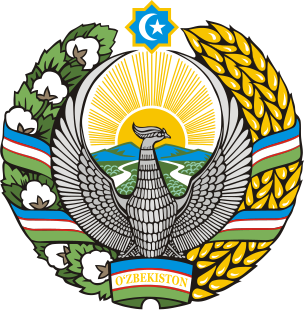 W
WThe Government of the Republic of Uzbekistan exercises executive power in the Republic of Uzbekistan. The members of the government are the President of Uzbekistan, Prime Minister of Uzbekistan, Ministers, and deputy ministers. It has its legal basis in the Constitution of Uzbekistan. Cabinet of Ministers - The Government of the Republic of Uzbekistan is the executive power body of the Republic of Uzbekistan, ensuring guidance over effective functioning of the economy, social and cultural development, execution of the laws, and other decisions of Supreme Assembly, as well as decrees and resolutions issued by the President of the Republic of Uzbekistan.
 W
WThe Armed Forces of the Republic of Uzbekistan, is the name of the unified armed forces of Uzbekistan, consisting of the Ground Force and the Air and Air Defense forces under the defence ministry). Paramilitary units include the National Guard, a Frontier Service. and a River Force. It is reported to be the largest, and the strongest in Central Asia. 'The country [has] also began professionalizing its military, an effort that has only limited success and erratic government support. But even in Uzbekistan, these changes represent merely a modest beginning and most of the benefits are concentrated in a few elite, higher readiness formations rather than uniformly applied to the entire force. The Uzbek military is woefully inadequate, but it is far superior to its neighbours.'
 W
WThe Frontier Service, officially called the Committee for State Border Protection of the National Security Service and commonly referred to as the National Border Guard, is a department of the military and National Security Service of Uzbekistan responsible for border security, part of the Security Service since 2005.
 W
WThe Constitution of Uzbekistan was adopted on 8 December 1992 on the 11th session of the Supreme Council of Uzbekistan. It replaced the Constitution of the Republic of Uzbekistan of 1978. It is the supreme law of the Republic of Uzbekistan. The Constitution of Uzbekistan contains six parts and it is further divided into 26 chapters.
 W
WCorruption in Uzbekistan is a serious problem. There are laws in place to prevent corruption, but the enforcement is very weak. Low prosecution rates of corrupt officials is another contributing factor to the rampant corruption in Uzbekistan. It is not a criminal offense for a non-public official to influence the discretion of a public official. The judicial system faces severe functional deficits due to limited resources and corruption.
 W
WKadyrov, Rashid (Rashitjon) Hamidovich – former prosecutor general of Uzbekistan, served as prosecutor general in the government of Uzbekistan in 2004. He was arrested on February 22, 2018 on suspicion of abuse of office, abuse of power and bribery. Human rights groups and organisations voiced their concern that since being detained he has been subjected to torture to force him to incriminate himself.
 W
WThe Legislative Chamber is the lower chamber of the Oliy Majlis of the Republic of Uzbekistan. It has 150 members, 135 elected for a five-year term in single-seat constituencies using the two-round system and previously until the new president came to power, 15 seats were taken by the Ecological Movement of Uzbekistan. Today, the Ecological Movement of Uzbekistan is a full participant, and participates in parliamentary elections as an "Ecological party of Uzbekistan". Elections of deputies to the Legislative Chamber are universal. Citizens of the Republic of Uzbekistan who have reached the age of eighteen by the election day have the right to vote. The citizens who have reached the age of twenty-five by the date of election and have been residing in the Republic of Uzbekistan for at least five years have the right to be elected to the Legislative Chamber. Citizens who are recognized to be incapacitated by the court, as well as persons held in places of detention by a court sentence, cannot be elected and participate in elections.
 W
WBelow is the list of leaders of present-day Uzbekistan since the establishment of Uzbek SSR in 1924.
 W
WThe Ministry of Agriculture of the Republic of Uzbekistan is a government administration body in Uzbekistan that implements a unified policy in the field of agriculture and food security.
 W
WThe Ministry of Defense of the Republic of Uzbekistan exercises administrative and operational leadership of the Armed Forces of the Republic of Uzbekistan. The Uzbek Minister of Defense is the nominal head of all the Armed Forces, serving under the President of the Republic of Uzbekistan, who is the Supreme Commander-in-Chief of the Armed Forces of the Republic of Uzbekistan. In this capacity, the minister exercises day-to-day administrative and operational authority over the armed forces. In wartime, the defense minister also serves in an official capacity as the Deputy Supreme Commander-in-Chief of the military. The General Staff, the executive body of the Ministry of Defense, implements the defense minister's operational instructions and orders. The Supreme Assembly exercises legislative authority over the Ministry of Defense through the Government of Uzbekistan, which is nominally responsible for maintaining the armed forces at the appropriate level of readiness.
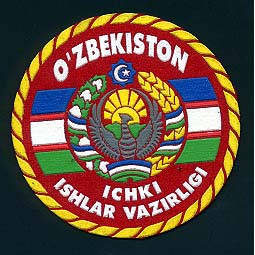 W
WThe Ministry of Internal Affairs of the Republic of Uzbekistan, is a body of the Government of Uzbekistan that is charged with the internal affairs of Uzbekistan and oversees the national police. The Ministry of Internal Affairs was founded on 25 August 1991. It replaced the Soviet Interior Ministry. The current Minister of Internal Affairs is Pulat Bobojonov. The ministry holds joint control over the Armed Forces of the Republic of Uzbekistan. It also administers the Academy of the Ministry of Internal Affairs, which is the official educational institution of the ministry.
 W
WThe Oliy Majlis is the parliament of Uzbekistan. It succeeded the Supreme Soviet in 1995, and was unicameral until a reform implemented in January 2005 created a second chamber.
 W
WThe president of the Republic of Uzbekistan is the head of state and executive authority in Uzbekistan. The office of President was established in 1991, replacing the position of Chairman of the Presidium of the Supreme Soviet of the Uzbek SSR, which had existed since 1925. The president is directly elected for a term of five years, by citizens of Uzbekistan who have reached 18 years of age.
 W
WThis is a list of prime ministers of Uzbekistan, from the establishment of the office in 1925 as the Chairman of the Council of Ministers of the Uzbek SSR to the present day.
 W
WA Hokim is The head of the local executive authority in the Samarkand Region in Uzbekistan. According to paragraph 15 of Article 93 of the Constitution, the regional governor and the city Hokim of Tashkent are appointed and dismissed by the President of the Republic of Uzbekistan on the proposal of the Prime Minister.
 W
WThe Supreme Council is the parliament of the Republic of Karakalpakstan. It succeeded the Supreme Soviet of the Karakalpak ASSR in 1994, and is a unicameral parliament.
 W
WThe Supreme Court of Uzbekistan is the most senior body of civil, criminal, and administrative law in the Republic of Uzbekistan. It is currently composed of the Supreme Court and the Supreme Economic Court, which were merged in February 2017.
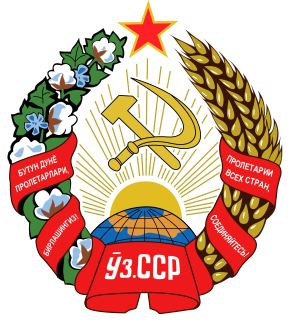 W
WThe Supreme Soviet of the Uzbek SSR was the supreme soviet of the Uzbek SSR from 1938 to 1991.
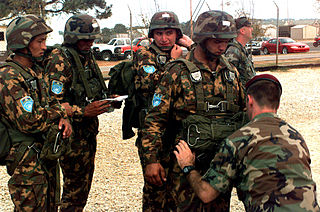 W
WThe Uzbek Ground Forces are the land component of the Armed Forces of the Republic of Uzbekistan. Operating since the collapse of the Soviet Union in 1991, the army is made up of former Soviet Army units that were in the territory of Uzbekistan. As of 2006, it had around 40,000 active personnel. Much of the equipment it uses is also old Soviet material, and the government of Uzbekistan has not given much effort to replace it with modern equipment.
 W
WThe Uzbek Navy, known officially as the River Force of Uzbek Frontier Committee are the naval arm of the Armed Forces of the Republic of Uzbekistan, serving under the Border Troops of the State Security Service.
 W
WThe Air and Air Defence Forces are the aerial arm of the Armed Forces of the Republic of Uzbekistan. It was formed following the collapse of the Soviet Union, in 1991, though the military was not created by the Uzbek government until 1992. The Air Force consists of 10,000 to 15,000 personnel, with most of them being Russians as of 1995.
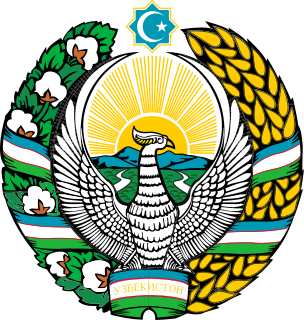 W
WThe office of vice president of Uzbekistan was a political position in Uzbekistan until it was abolished on January 8, 1992.